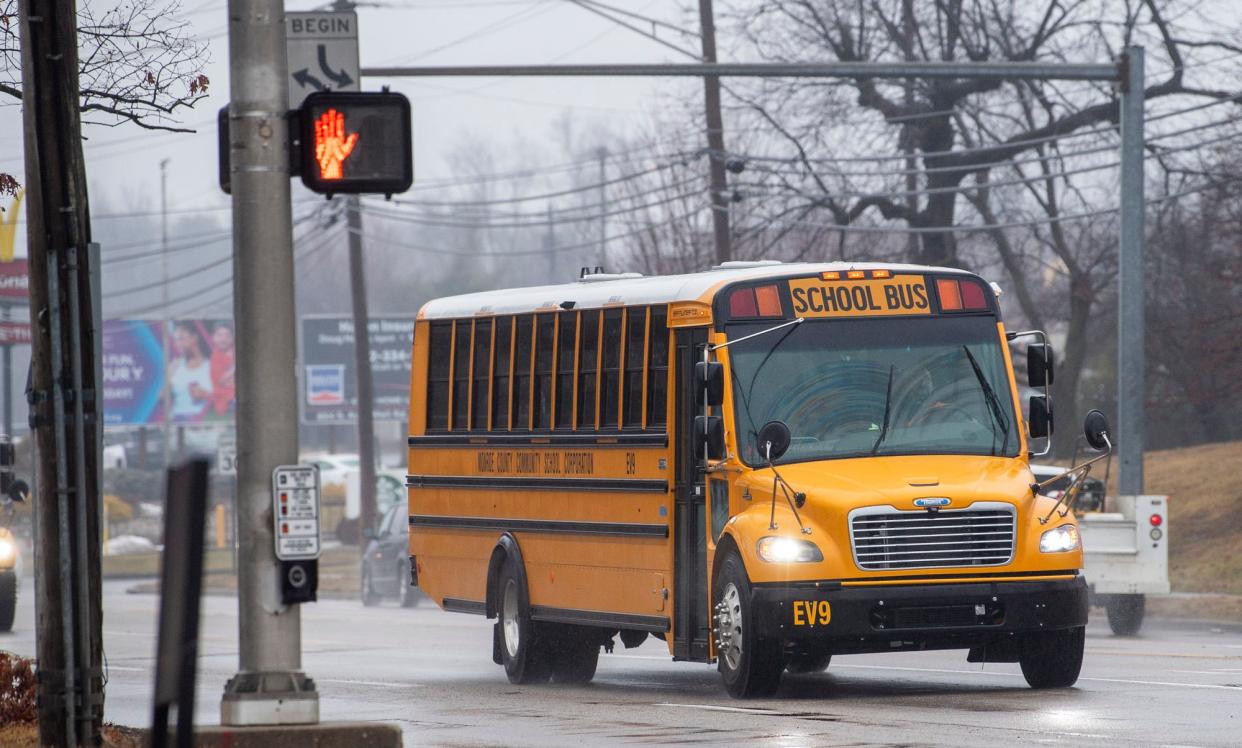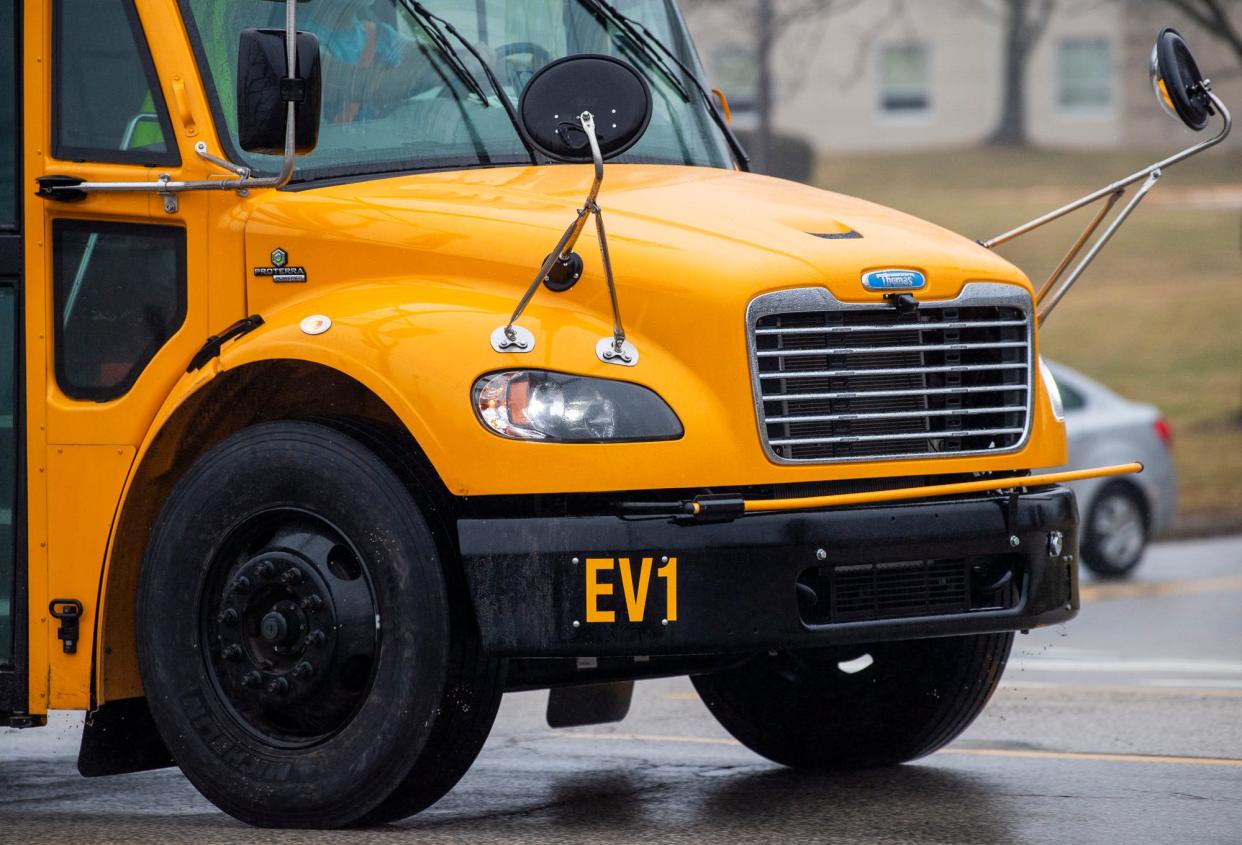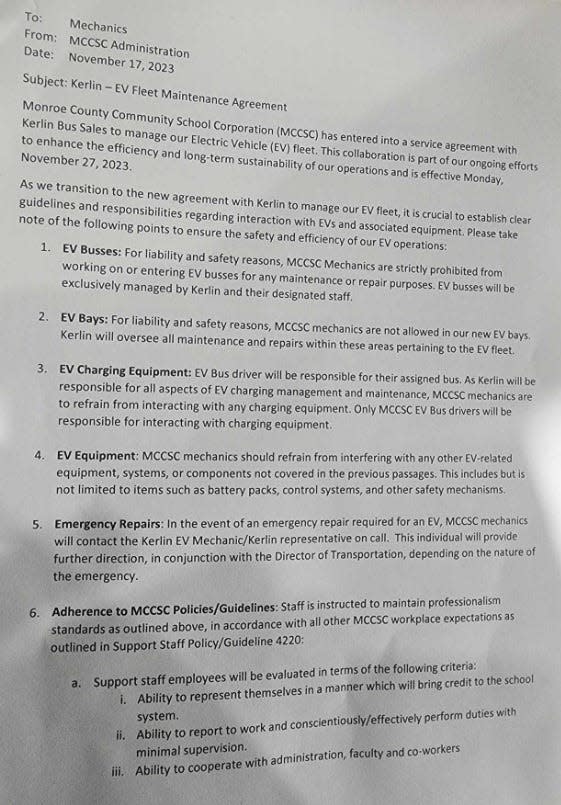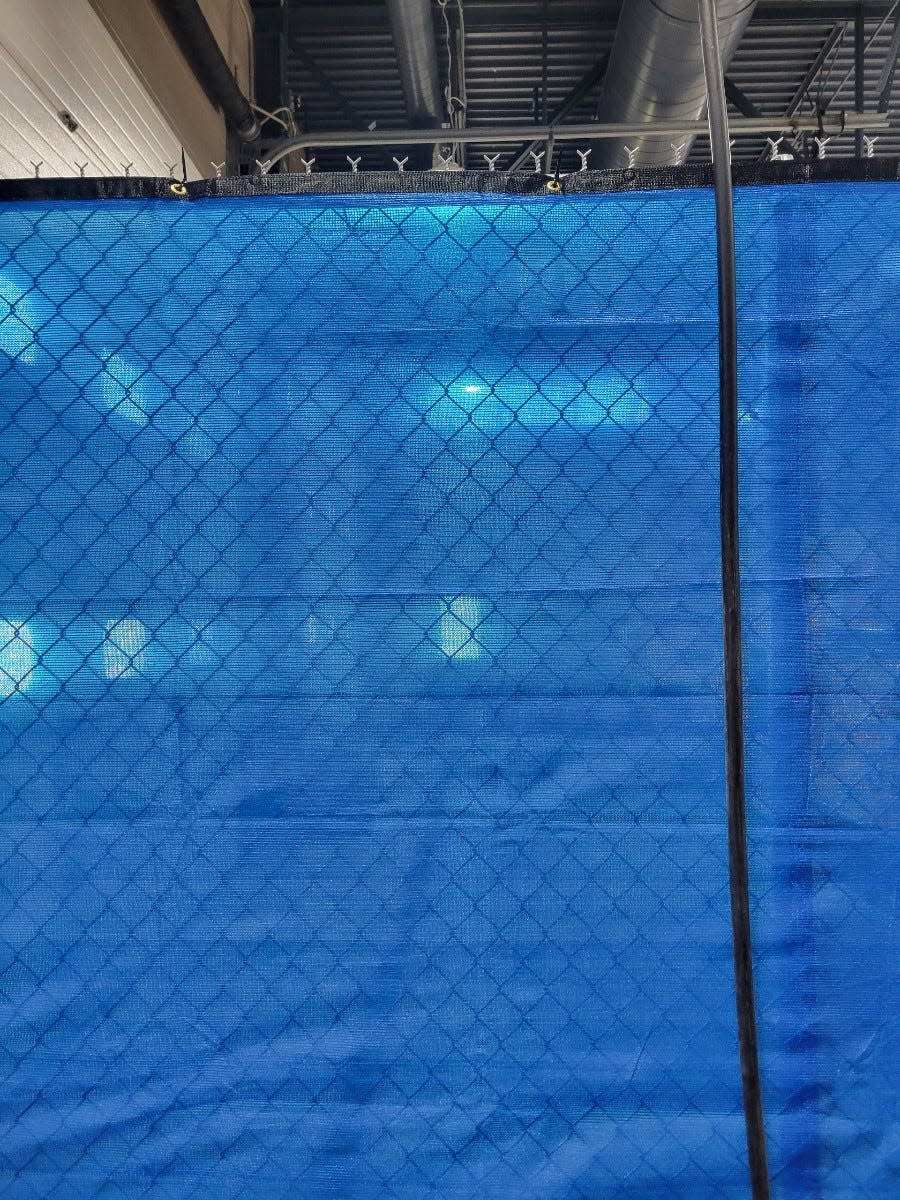Danger, mistrust, fear: Local schools' switch to electric buses is causing fissures

Local electric school buses are breaking down much more often than their diesel counterparts and often take much longer to repair — sometimes months, MCCSC transportation insiders said.
What’s more, the sources said, the buses often break down without warning, leaving the bus stranded in the middle of an intersection or on a hill, potentially endangering drivers and students.
“We’ve had several breakdowns while the buses were in motion,” one of the sources familiar with MCCSC transportation issues said.
“You’re dead in the water,” said another.
The sources emphasized they were not aware of any accidents that had occurred as a result of a bus breakdown, but said they’ve had close calls and worry that accidents are but a matter of time.
Five Monroe County Community Schools Corp. transportation employees spoke on condition of anonymity, as they were not authorized by the administration to speak publicly. The sources said if they allowed their names to be used in the story, they feared being fired.
The sources also said the MCCSC administration, through a new deal with a contractor, has undermined the school corporation’s mechanics, whom administrators recently prohibited from even entering the electric vehicles.
The insiders said the administration’s actions have pitted Kerlin, the school corporations’ bus supplier, against long-time employees, including bus drivers, some of whom were accused of trying to sabotage the electric buses and contributing to the breakdowns — an accusation the insiders described as upsetting and preposterous.
While the sources said they have taken their complaints to the MCCSC administration and board — through third parties so as not to reveal the insiders’ identities — nothing has changed.
The lack of intervention from administrators, the insiders said, has left them to work in an environment of uncertainty, mistrust and fear.
Their fears resemble those of other MCCSC employees, including principals and teachers, who, in the last few weeks have said they did not feel comfortable speaking on the record on controversial subjects because they feared backlash from administrators.
The Herald-Times around noon Thursday filed an interview request with MCCSC to speak with Superintendent Jeff Hauswald, Transportation Director Scott Waddell and the school corporation’s lead mechanic.
Late Friday afternoon, Kelby Turmail, the district’s communications officer, said via email, “We are unable to respond on this request at this time.”
On Tuesday, replying to a follow-up email asking whether the administration could make someone available for an interview on Monday or Tuesday, she said, "We do not have anyone available to speak on this. Please go forward with your story."
MCCSC board president April Hennessey referred questions to Ashley Pirani, the board’s assistant secretary, as she had, over the winter break, worked on putting together questions she sent to the administration this month.
Pirani said she did not want to provide examples of what she asked until she got her answers, which, as of Thursday afternoon, she had not. She said Hauswald, the superintendent, told her he would pass the inquiry to Adam Terwilliger, the district’s director of finance and logistics.
Pirani said she had heard about problems with the electric buses through public comments at school board meetings but had not spoken directly with drivers, mechanics or the transportation director, because she said she believes board protocols prohibit her from interacting with MCCSC employees without going first through the administration.
“We’re not allowed to speak with teachers either,” she said.
Bus drivers: Electric school buses sometimes being repaired for months

MCCSC has about 90 drivers and more than 100 buses, 23 of which are electric. The corporation is expected to take possession of at least five more electric buses this school year and 10 more next year, the sources said.
School districts are buying electric buses because of lower fuel costs, much quieter operation compared to diesel buses and because electric buses don't directly produce exhaust fumes, which harm the environment including human health.
School districts across the country also are buying electric vehicles because of substantial federal grant money. New diesel school buses cost about $185,000, while their electric counterparts can easily cost twice as much. However, with the help of federal tax dollars, school districts can get an electric buses for less than what they would pay for a diesel bus.
The U.S. Environmental Protection Agency has received $5 billion to spend through 2026 to help school districts replace existing buses with zero-emission and low-emission models.
Local bus drivers said they generally support the idea of replacing diesel buses with electric buses, in part because the electric buses are much quieter, allowing for easier interaction between the students and the drivers.
“I’m a big fan of electric vehicles,” one of the drivers said.
However, the local transportation insiders said the electric buses break down with greater frequency and take longer to repair than the diesel buses. When diesels break down, local mechanics usually have them back on the road within a day or two, the insiders said, because replacement parts are easily available, and local mechanics have a lot of experience in fixing the diesels.
The insiders said the local electric buses, all of which are from Thomas Built Buses, break down about three times as often as the diesels. The electric buses also often are out of commission for weeks or even months. That’s because local mechanics are not allowed to work on them and because parts are difficult to get. Adding to the difficulties, Proterra, a California-based company that was supplying Thomas with batteries for the buses, filed for bankruptcy last year.
Bus fleets that are adopting electric vehicles across the country are experiencing similar problems as MCCSC: The city of Austin said its Proterra-made electric city buses have been “less reliable and harder to fix,” according to KUT News, the city’s NPR affiliate.
And Ken Black, transportation director of Elk Grove Unified School District near Sacramento, California, told the H-T that the three Thomas buses the district received did not work well.
“We had a lot of reliability issues,” he said.
In the first few months, there were very few days — if any — where all three buses were on the road, Black said.
The low mileage of the buses didn’t help, he said. The Elk Grove district covers nearly 400 square miles, and the electric buses would go only about 50 miles before they needed to be recharged. That meant the buses were recharging as drivers needed them for a second route and then to take students to extracurricular activities.
“They’ve had very little application in our fleet,” Black said.
He said the district has had some success with electric buses from IC Bus, which have been “fairly reliable” and have a range of about 130 miles.
The MCCSC transportation insiders said they would like the district to try some electric buses from companies other than Thomas, as they have heard good things about some of those buses. However, the insiders said, the MCCSC administration so far has bought only Thomas buses and refused to diversity.
The MCCSC buses are provided by Kerlin Bus Sales & Leasing, based in Silver Lake, Indiana, a town of fewer than 1,000 residents about an hour’s drive west of Fort Wayne.
Dave Dorsett, the company’s regional account manager for electric vehicles, said Friday he was the right person to interview about the Thomas buses but was on the road and would call back. He did not. He also did not reply to a subsequent email message. Neither did Chris Foster, the media contact for Daimler Trucks, the maker of Thomas buses and part of Germany-based Mercedes-Benz Group.
Dorsett was, for a very short period, the MCCSC transportation director. The local school board hired Dorsett for that job on June 28, 2022. Less than a month later, on July 26, 2022, the MCCSC board hired Scott Waddell for the job, and he remains the district’s transportation director today.
The MCCSC transportation insiders praised Waddell and the local mechanics for their work and dedication and emphasized the problems do not lie with them. In fact, they said they trust the mechanics implicitly because they’ve worked with many of them for years.
MCCSC mechanics 'strictly prohibited' from entering EV buses
To the insiders, then, it was a surprise to hear the administration recently told the mechanics they would not be allowed to work on the electric buses.
The new policy marks a 180-degree turn for the administration, which said in a news release about three years ago, when it received its first electric bus, that “MCCSC mechanics will be trained by the Kerlin Bus mechanics to be able to service the electric buses.”
However, just days before Thanksgiving last year, the administration informed mechanics in a two-page memo that MCCSC had entered into a service agreement with Kerlin to manage the electric buses “to enhance the (program’s) efficiency and long-term sustainability.”
The administration told mechanics that “for liability and safety reasons” they were “strictly prohibited from working on or entering EV buses for any maintenance or repair purposes.”

The administration, after listing the new prohibitions in the memo, spent half a page to remind the mechanics that they were expected to “maintain professionalism,” to report to work and “conscientiously/effectively perform duties with minimal supervision” and to show an ability “to cooperate with administrations, faculty and co-workers.”
The memo also told mechanics they were expected to engage in professional interactions and to arrive on time with a “professional appearance.”
The administration, toward the end of its memo, reminded mechanics they can be fired for causes including “inefficiency, immorality, insubordination, neglect of duty, physical or mental incapacity, conviction of a felony or crime involving moral turpitude, inadequate performance, irregular attendance which interferes with the efficiency of the operation and elimination of position.”
The memo ended with, “Your dedication to maintaining our high standards of safety and performance is greatly valued as we adapt to new technologies and vehicles.”
The local transportation insiders said for many of the drivers and mechanics who had put in long hours in the last few years to familiarize themselves with the electric buses, the memo felt like a slap in the face.
The situation has gotten so bad, they said, that Kerlin and the administration have commandeered part of the local bus garage and installed fences to prevent the MCCSC mechanics from accessing the bays where the electric buses are being fixed. A blue tarp-like screen prevents people from even looking into the Kerlin bays.

The policy surprised Black, the transportation director in California, who urged schools that are adopting electric buses to get their mechanics trained right away.
“I can’t afford to have my buses sit in someone else’s garage,” he said.
Black also said without federal grants to help defray the higher cost of electric buses, the purchases do not make sense strictly from a fiscal perspective. Even over the life of the bus, the higher up-front cost of electric buses cannot be recovered through diesel fuel savings.
Black also suggested school districts make the switch incrementally, as the electric buses and the charging infrastructure change and improve rapidly. Some districts, he said, get grants for buses but then have to wait a year or two for the charging infrastructure to be available for installation. That means the buses may sit idle for a couple of years.
“People need to really plan their infrastructure,” he said.
Boris Ladwig can be reached at bladwig@heraldt.com.
This article originally appeared on The Herald-Times: Drivers say MCCSC's electric Thomas Built Buses break down often
